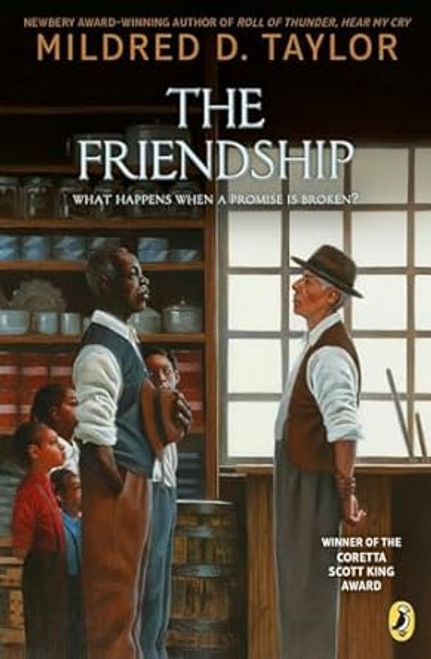Product Overview
The Stranger: A Literary Exercise In Existentialism
In The Stranger, Camus explores existential questions about the meaning of life, the absurdity of existence, and the inevitability of death.
Ordering Books for The Stranger by Albert Camus
No order minimum; you can order just one copy if that's all you need! :-) Order your class set of books for The Stranger now, and take advantage of our bulk order discounts!
About the Book The Stranger by Camus |
Meursault is a detached and dispassionate French-Algerian man who lives a seemingly mundane existence. The story begins with the death of Meursault's mother, an event that sets the tone for his indifferent outlook on life. Throughout the book, Meursault's actions and reactions, or lack thereof, provide a stark contrast to societal norms and expectations. Following his mother's funeral, Meursault returns to his life in Algiers, where he engages in a casual romantic relationship with Marie and befriends his neighbor Raymond. This friendship leads to a pivotal moment when Meursault becomes involved in a conflict that results in him killing an Arab man on a beach. His lack of remorse and emotional detachment becomes glaringly evident during his trial, leading to his conviction and eventual execution. The plot of The Stranger isn't merely about the events that transpire but rather about Meursault's indifferent reaction to these significant moments.
|
Themes in the book The Stranger by Camus |
Existentialism and Absurdism: The Stranger is an exploration of existentialist and absurdist philosophy. Camus uses Meursault's character to demonstrate the absurdity of life and the inevitability of death. Through Meursault's indifferent attitude and lack of emotional response, Camus illustrates the existential belief that life has no inherent meaning, and it is up to individuals to create their own purpose. Isolation and Detachment: Meursault's detachment from society and his emotional isolation are central themes in The Stranger. His inability to connect with others and his indifference to social conventions highlight the profound sense of alienation that defines his character. This detachment is evident in his relationships, his reaction to his mother's death, and his lack of remorse for the murder he commits. The Absurdity of the Human Condition: Camus uses The Stranger to depict the absurdity of the human condition. Meursault's trial, in particular, serves as a critique of the judicial system and societal expectations. The focus on Meursault's character and his perceived moral failings, rather than the actual crime, underscores the absurdity of the human condition and the arbitrary nature of justice. This theme is also evident in the novel's ending, where Meursault finally accepts the meaninglessness of life and embraces his fate. The Role of Death: Death is a prevalent theme throughout The Stranger. From the beginning of the novel, Meursault acknowledges the inevitability of death and shows little to no fear or concern about it. His lack of emotional response to his mother's death and his nonchalant attitude towards his own impending execution highlight Camus' existential belief that death is an unavoidable part of life. It also serves as a reminder that, in the grand scheme of things, our individual lives are insignificant and ultimately meaningless. The Illusion of Free Will: The concept of free will is a recurring theme in The Stranger. Meursault's actions, or lack thereof, and his detached perspective on life suggest that he is governed by impulse rather than rational thought. This idea challenges the traditional notion of free will and instead presents the idea that humans are products of their environment and circumstances. Meursault's fate seems predetermined, highlighting the illusion of control we have over our lives.
|
Activity Ideas for the book The Stranger by Camus |
Character Analysis: Encourage students to analyze Meursault's character by examining his actions, motivations, and the philosophical implications of his behavior. Have them discuss how Meursault's detachment and indifference shape the narrative and what this reveals about existentialist and absurdist philosophy. Theme Exploration: Divide students into groups and assign each group a specific theme from the novel, such as existentialism, isolation, or absurdity. Ask them to find passages that illustrate their assigned theme and present their findings to the class. This activity will help students understand how these themes are woven throughout the narrative. Socratic Seminar: Conduct a Socratic seminar focused on the philosophical questions raised by The Stranger. Some potential questions include:
Creative Writing: Ask students to write a first-person narrative from the perspective of a minor character in the novel, such as Marie or Raymond. This exercise encourages them to consider different viewpoints and explore how other characters perceive Meursault and his actions. Debate: Organize a classroom debate on whether Meursault is a hero or an anti-hero. Students can use evidence from the text to support their arguments, fostering critical thinking and deeper engagement with the character and themes. Philosophical Journals: Encourage students to keep a journal where they reflect on and react to the novel as they read it.
|

Customer Service
- We guarantee you'll have the best customer service experience ever with Teacher's Pet Publications.
- We are here to help make things as easy as possible for you!
- Your information is secure. We don't keep your card number on file anywhere, and we don't sell, rent, or give away your personal information.
- We treat you as we would like to be treated as a customer!
- Need help? Have questions? We're always happy to assist you! Contact Us











